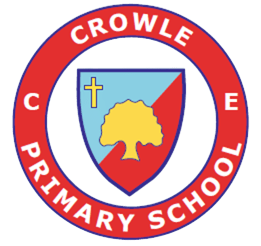English
We have worked hard as a school to embed The Write Stuff which has resulted in some high quality writing across all phases.
Intent
At Crowle we believe that a quality English curriculum should develop children’s love of reading, writing and speaking and listening skills. We believe that a thorough grasp of literacy skills is crucial to a high quality education and will give our children the tools they need to participate fully as a member of society.
Reading: We aim to inspire an appreciation of our rich and varied literary heritage and a habit of reading widely and often.
Writing We recognise the importance of cultivating a culture where children take pride in their writing, can write clearly and accurately and adapt their language and style for a range of purposes - to entertain, inform, explain and persuade.
Speaking and listening: We want to inspire children to be confident in the art of speaking and listening and to use discussion to develop their understanding across the curriculum.
Implementation
Our English curriculum is derived around a variation of high quality, age appropriate texts, films and images to develop reading fluency and reading comprehension with a focus on key reading strategies and skills; develop knowledge of grammar and punctuation and develop the understanding required to use and apply these skills across the curriculum.
Reading: A love of reading is fostered in all classrooms with opportunities to read and hear a range of texts in all classrooms. Each classroom has a regularly updated book box where children can borrow books to take home or take time out of their busy day to enjoy a quiet moment with a book. The school library is in the process of being updated to create an inviting space for all children to choose their reading book or use non-fiction texts to support their independent learning across the curriculum. In Reception Miss Uzzell invites parents to join her and the children for family Friday each half term - at least two of these sessions over the year will have a reading focus - when parents and children can share books together, play phonic games or engage in story telling activities. In Years One to Four parents are invited into class to share a 'live' whole class "Hooked on Books" reading session. Reading records are used to share the children's reading progress across home and school. The importance of reading is enhanced through celebrating world book day, inviting authors and illustrators into school, introducing a "book swap" for staff and children alike, inviting children to "recommend a book" to their peers as part of collective worship and welcoming the local community to read with the children.
Writing: We endeavor to provide a vocabulary rich environment, all curriculum boards include key vocabulary which the children are encouraged to use in their writing. From year 2 to year 4 spelling and punctuation is taught discretely to ensure that children learn the spelling rules linked to the national curriculum for their year group. During a visit to the Reception classroom you will find the children developing the foundations for writing through a range of activities to include; fine and gross motor activities to develop an appropriate pencil grip and pencil control, phonics to develop the children's awareness of graphemes (letters) and phonemes (letter sounds) for spelling, writing opportunities within the continuous provision both in the classroom and outdoor area and helicopter stories to develop sentence structure and story telling language. Moving through to Year 1 and 2 you will discover the more formal teaching of writing through sequences of learning that build a particular genre of writing. These lessons are delivered through the pedagogy supported by The Write Stuff. Children are encouraged to share their ideas based on the initiation from the text, clip, object or picture. The teacher will go on to model writing an effective sentence before the children write their own sentences. Their piece of writing will build step by step over the sequence of lessons. A similar approach based on The Write Stuff will also be found in years 3 and 4 with children developing their writing through new techniques. Across the national curriculum classes pupils are encouraged to end a block of lessons with an independent write which involves planning, drafting, writing, evaluating and improving. Across school handwriting is taught using the Nelson Handwriting Scheme.
Impact
We measure the children's progress and attainment through a rigorous cycle of pupil progress including PIRA reading assessment, pupil progress meetings and regular moderation of writing judgements. Scrutiny by the headteacher, English lead and Governors ensure that the curriculum intent is supported through the outlined implementation in all classrooms. As a result of our curriculum development , we have a community of enthusiastic readers and writers who enjoy showcasing their developing literacy skills. They are confident to take risks in their reading and writing, and love to discuss and share their ideas. Pupils are performing inline with expected or beyond expected attainment. Pupils with SEND are making rapid progress in reading and writing. Pupils transition from EYFS into KS1 fully prepared for the challenges of the national curriculum while our year 4 leavers are equipped with the necessary literacy skills for the next step of their learning journey at Middle School. Children regularly read at church services, take collective worship and enter writing competitions through young writers
Please find our reading and writing curriculum documents at the bottom of this page.
Reading Together (for pleasure)
We treasure our "Reading Together" sessions. Our books are specially chosen from a Reading Spine to ensure we are using high quality texts that enable us to extend our vocabulary and absorb ourselves through high quality stories and poems. Please find the book list below:
